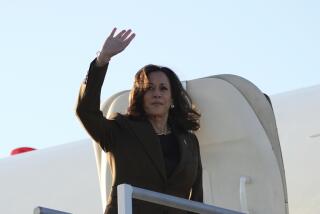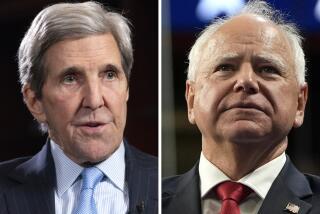Clark’s Camp Makes Rookie Mistakes
- Share via
CHARLOTTE, N.C. — The Rev. Al Sharpton had just left, whisking to Washington to attend a fund-raiser. Rep. Dennis J. Kucinich (D-Ohio) had also departed after inveighing against the war in Iraq. And none of the other Democratic presidential candidates had made it to the forum here, owing to personal engagements, foul weather and mechanical trouble on airplanes.
So for nearly half an hour Friday night before a state convention of the NAACP, retired Army Gen. Wesley Clark had the stage to himself. It was an apt metaphor for his campaign.
In the four weeks since he announced his candidacy, Clark has captured much of the political spotlight. He bolted to the top of several national polls (the latest CNN/USA Today/Gallup Poll shows him leading former Vermont Gov. Howard Dean, 21% to 16%, among registered Democrats), made inroads into the Democratic network of wealthy donors and drew attacks from other candidates at a debate in Phoenix last week -- sure evidence that he has them worried.
Clark exudes optimism, telling audiences that if polls keep going his way, “President Bush will need a brother in every state.” The reference to Florida Gov. Jeb Bush and the role that state played in the 2000 election is a crowd-pleaser among Democratic partisans.
In his first run for public office, Clark has proved a quick study on the campaign trail. He locks eyes with voters, listening. He autographs copies of his books, poses for photographs, seems unfazed by voter antics. “You just talked to the next president of the United States, babe!” one supporter exclaimed to his wife after he thrust his cellphone at Clark for a little long-distance campaigning.
But beneath the national poll numbers and the enthusiastic crowds are signs of a campaign stumbling out of the gate.
The campaign manager quit last week, alleging that “professionals” brought in to manage the effort were squeezing out the grass-roots activists who encouraged Clark to run in the first place.
Under scrutiny from the Federal Election Commission, Clark agreed to stop giving paid speeches.
And Clark is still trying to recover from his most significant slip -- the confusion he created about his stance on the Iraq war.
Shortly after declaring his candidacy last month, he said he probably would have voted for the congressional resolution that authorized force against Iraq. He then reversed himself. Clark now often blames Bush for “getting us into a war we didn’t have to fight,” but his rivals continue to raise questions about his position and -- by extension -- his credibility.
The missteps are not likely to be fatal. Rep Richard A. Gephardt (D-Mo.) and Sen. John F. Kerry (D-Mass.) have weathered staff shakeups, and Dean has felt reverberations from his statement that it’s not the place of the United States “to take sides” in the Israeli-Palestinian conflict.
But to Charles Cook, a Washington-based independent political analyst, Clark’s problems underscore the drawbacks of a late-starting campaign by a newcomer to politics.
“How you would have voted on Iraq is not a trick question,” Cook said. “That’s why these first-time candidates rarely do well. Dick Gephardt started as an alderman. He’s been doing this for 1,000 years. [Such candidates] tend to make fewer mistakes.”
When Donnie Fowler resigned as Clark’s campaign manager last week, he provoked a flurry of chatter on the Internet sites that for months had been urging Clark to run. “By the time you read these words, the bell will be tolling for Wesley Clark’s candidacy,” said one missive, on www.DraftClark.com.
But other principals in the movement said there had been no effort to sideline them.
“I’m sorry Donnie Fowler left because I think he’s a talented guy, but I don’t see what he saw,” said Josh Margulies, one of the founders of www.DraftWesleyClark.com who now is working for the campaign in Little Rock, Ark., Clark’s hometown. “I shut down my law practice in New York City; I’m sleeping on a futon; I call my wife to see if the baby’s kicking or not. Believe me, if the Draft Clark movement were being ignored or disrespected, I would have called a press conference.”
By week’s end, the staff situation seemed to be calming. A bevy of former President Clinton’s advisors have been recruited, including Eli Segal as CEO of the campaign, former Commerce Secretary Mickey Kantor as chairman of the steering committee and Diana Rogalle, former finance director for the Democratic Senatorial Committee, as finance chair.
Chris Lehane, who was Al Gore’s campaign spokesman in the 2000 campaign and who recently quit Kerry’s staff, is considering an offer to join Clark’s campaign. His wife, Audrey Evans, has already closed her San Francisco law firm to join the team.
For his part, Clark rarely misses an opportunity to thank the draft movement. In his first Internet journal, called a blog, he told them, “You’ve been the key to everything, and I know it! And I am your champion.”
On Monday, he plans to meet with grass-roots supporters at a restaurant in Key Biscayne, Fla.
The campaign is starting to hone Clark’s message. He plans four speeches in the coming weeks to detail his positions on the economy, national security and other issues; the first is scheduled for Tuesday at Hunter College in New York.
Clark’s staff also is assessing its electoral strategy. With several of the other candidates already well organized in Iowa and New Hampshire -- the two crucial battlegrounds in January -- the Clark campaign is leaning toward making its stand in the cluster of states with primaries on Feb. 3. These include South Carolina, Arizona and Oklahoma.
Amassing the money to compete in several states at once looms as a concern for the Clark campaign. Dean has set the pace among the Democrats by raising more than $23 million; with his late start, Clark’s treasury is paltry compared to that.
But Clark’s aides were encouraged that he took in about $3.5 million in the first three weeks of his campaign. His efforts were aided by Hollywood -- producer Norman Lear and actors Mary Steenburgen and Ted Danson are among those who have hosted money-raising parties for Clark.
“Gen. Clark has demonstrated, on a couple of trips to California, that he can turn them out,” said Norman Pattiz, chairman of Westwood One and a major Democratic donor. “I wrote him a check and introduced him to some people. And if he’s there at the end, I would certainly support him, but there are so many others I like.”
Mentioning Dean, Gephardt, Kerry and Sen. Joe Lieberman (D-Conn.), Pattiz added, “They all deserve a chance.”
Nor was Clark the clear choice at Friday night’s NAACP gathering.
The audience cheered loudly whenever Sharpton or Kucinich attacked the Bush administration. The USA Patriot Act -- the domestic security measure passed after the 2001 terrorism attacks -- came in for special venom, with Sharpton calling it “an absolute move toward fascism and totalitarianism.”
Clark was more temperate. Although he criticized Atty. Gen. John Ashcroft as “not much of an attorney, and I know for sure he’s not a general,” Clark said he doubted that many had read the 1,200-page law and advocated congressional hearings on it.
Whether such a measured approach will play among the partisan activists who tend to vote in primaries is among the key questions surrounding his candidacy.
More to Read
Get the L.A. Times Politics newsletter
Deeply reported insights into legislation, politics and policy from Sacramento, Washington and beyond. In your inbox twice per week.
You may occasionally receive promotional content from the Los Angeles Times.










